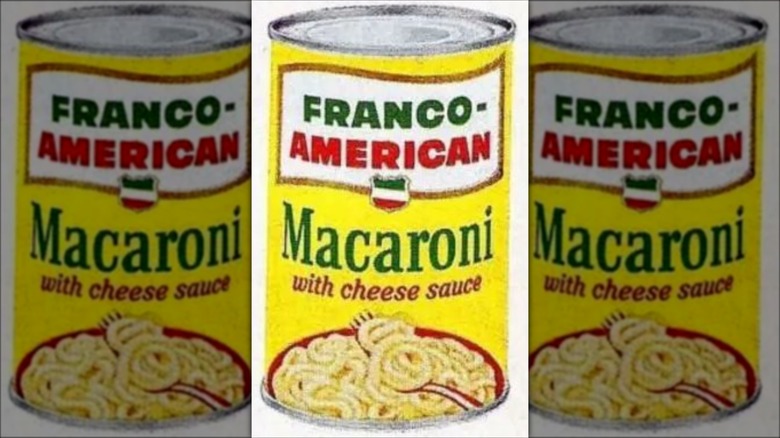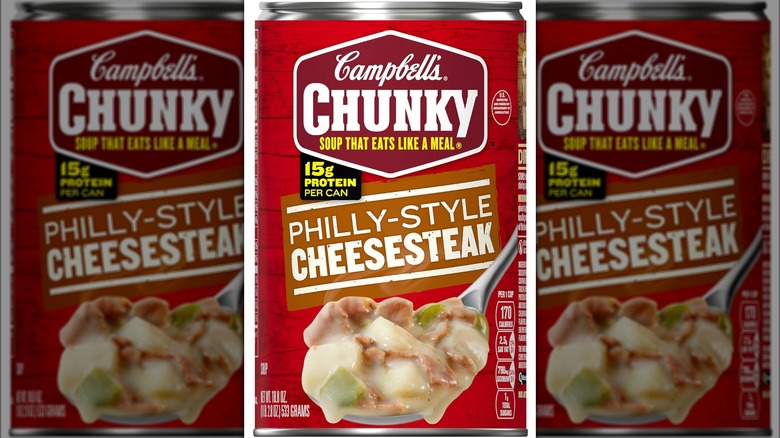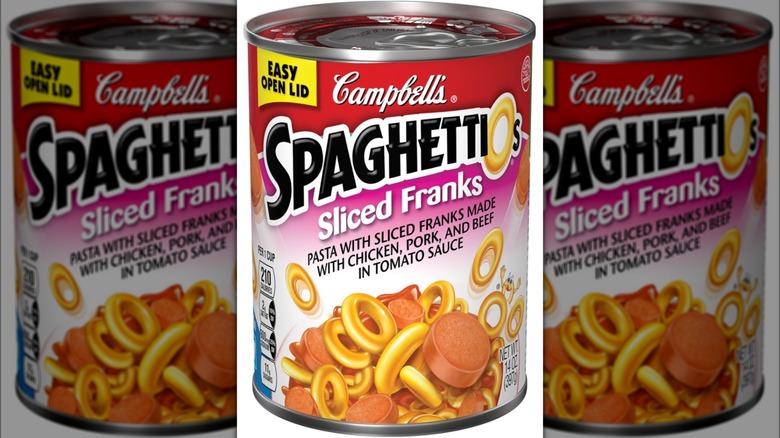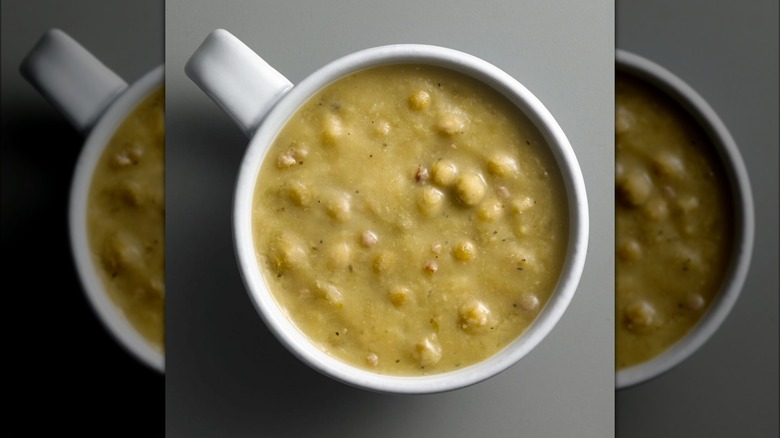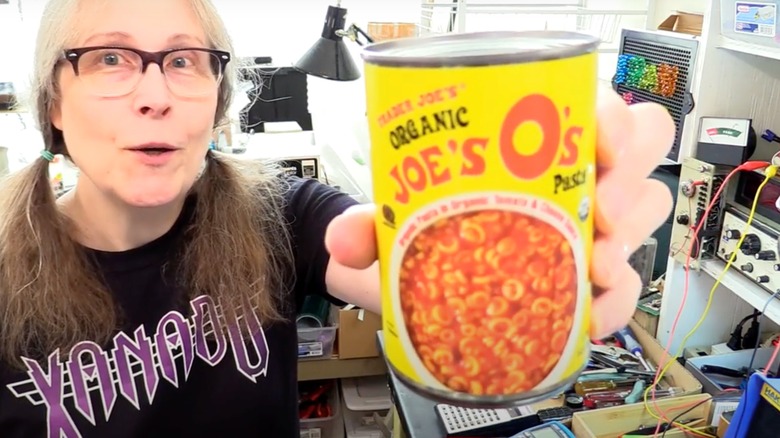14 Discontinued Canned Foods You'll Probably Never Eat Again
We may receive a commission on purchases made from links.
Canned foods are an integral part of daily life. Ever since its invention in the late 18th century, canning has been a food preservation method that's helped us to enjoy seasonal items year-round, fed troops overseas, and allowed food companies to lean into their oddest impulses (if you've ever seen canned frogs legs on the shelf in a gourmet food store, you'll know what we're talking about). A huge part of the appeal of these foods is their lifespan. However, while canned foods can last for a seriously long time, food trends tend to be somewhat shorter — and there have been plenty of canned foods that have come and gone over the years.
While some canned foods were clearly trying to capitalize on what was fashionable or appealing at the time, others may have suffered from increasingly poor sales, leading to their discontinuation. There are also lots of examples in food history of companies looking to slim down their canned food product lines, leading to some beloved favorites being removed from shelves for good. We're here to deep-dive into canned food history and unearth some preserved classics that have gone out of circulation, but which you might just remember eating.
Nuteena
People who favor plant-based foods have traditionally been pretty well catered-to by canned goods. Beans, lentils, and vegetables are all canned staples, after all. However, plant-based meat alternatives are slightly harder to find in cans, and with the disappearance of Nuteena in 2005, things became even harder. Nuteena was a peanut-based plant loaf designed to mimic the texture of meat, which was manufactured and sold by Loma Linda from the 1960s to the mid-2000s. This solid mass of brown-gray matter tasted somewhat of peanut butter, and came out of the can in a solid cylindrical lump, which you could then slice to your heart's content.
Nuteena was particularly popular with Seventh-day Adventists and was marketed towards the community due to their traditional plant-based diet. It was particularly popular as a sandwich filling, but was also used in salads, tamale pies, or pretty much any recipe that called for meat (as long as you could stomach the peanut taste). Sadly for Nuteena lovers, the decision was made to axe the product, without much explanation as to why. Nuteena still has a passionate legion of fans out there that reminisce about its particular taste online, with copycat recipes being devised so that people can still get their fill. However, if you want to find it in stores, you're out of luck.
Campbell's Pepper Pot Soup
Pepper pot soup is a lunch that packs a punch. This spicy, meaty soup is especially associated with Philadelphia, where it's been part of the city's food culture for generations – something that Campbell's Soup Company had a large hand in. The food business premiered its Pepper Pot Soup way back in 1899, and offered folks in Philadelphia (and around the country) the ability to enjoy the soup without the hours it would take to simmer it on the stove. It was popular enough to stick around for more than a hundred years, but as the local popularity of pepper pot soup started to wane locally and people started to favor other recipes, so did sales of this canned food.
Eventually, in 2010, things ended for good. Campbell's pulled the soup out of production, stating that customers were looking for other flavors and implying that pepper pot soup had fallen out of fashion. Unfortunately, this decision didn't go down well with its loyal customers, many of whom flocked online to voice their unhappiness. While there are still many cooks out there who are championing pepper pot soup, there's no doubt that Campbell's decision pushed it even further into the history books.
Del Monte Canned Pudding
Before pudding cups, there were pudding cans. Yep, it was a thing, guys. Canned food giant Del Monte jumped on the pudding can train, which was already started by Hunt-Wesson Foods with its Snack Pack pudding in 1968, in the early '70s. The product consisted of a smooth, creamy pudding encased in a ring-pull can, and came in several different flavors, including chocolate and vanilla.
We can see why these products were appealing, to be honest: Thanks to their canned nature they had a long shelf-life, didn't have to be placed in the refrigerator, and were secure enough to be knocked around in your kids' lunchboxes until they were ready to eat. Over time, though, these cans started to be phased out. By the 1990s, Del Monte was championing plastic pudding cups, and its canned puddings receded into the background. It's not entirely clear why Del Monte chose to move to plastic instead of metal, but we'd imagine it was due to a combination of cheaper manufacturing costs, lighter-weight packaging, and one too many kids' fingers being cut on the side of the can while they scooped out their pudding.
Franco-American Mac and Cheese
Go to any store, and you'll likely be able to find a few different varieties of canned mac and cheese. However, one brand you won't see on shelves anymore is Franco-American. Franco-American Mac and Cheese had a long and illustrious history, and first hit stores in 1939, just as the Second World War was commencing. Because the war disrupted supply chains and ingredient availability massively, it quickly disappeared, before coming back again 10 years later.
During the second half of the 20th century, Franco-American Mac and Cheese was pretty popular. People loved it for its unique pasta shapes, with its long, squiggly tubes making it stand out from the pack and giving it just that bit more bite and substance. The canned mac and cheese stuck around until the early 2000s, and it was then that things started to change. The parent company of Franco-American, Campbell's (heard of that little-known soup?), decided to streamline its product lines and incorporated Franco-American Mac and Cheese into its flagship Campbell's brand. While Campbell's mac and cheese stuck around for a little while longer, it was then discontinued, and these days the Franco-American version is just a memory.
Campbell's Chunky Philly-Style Cheesesteak Soup
If you didn't think that Philly-style cheesesteak soup was a thing, you clearly haven't been paying enough attention to our good friends over at Campbell's. The soup supremo debuted this niche soup flavor back in 2014, in line with the Super Bowl XLVIII. Campbell's Chunky Philly-Style Cheesesteak Soup was released at the same time as a few other new flavors, with its Spicy Chicken Quesadilla and Hearty Cheeseburger products also hitting the market. One of the ideas behind these rib-sticking varieties was to keep folks warm in the winter months.
We're pleased to report that the Chunky Philly-Style Cheesesteak Soup didn't contain any bread (we personally can't imagine what a disaster that would have been), and instead got its carb content from chunks of potato. It offered an impressive 7 grams of protein per cup, and like many other canned coups, a pretty wild amount of sodium — 790 milligrams per cup, to be exact. Alas, the soup didn't go down too smoothly with customers, who felt that the soup was incredibly unappetizing and made a mockery of real cheesesteaks. It was soon discontinued, and you won't find it next to the other Campbell's products anymore.
Pumpkin Spice Spam
Yep. We can't believe we're about to type these words guys, but: Pumpkin Spice Spam exists. Or rather, existed once upon a time, way back in 2019. This frankly baffling product debuted at the turn of the decade at a time when the pumpkin spice craze was in full swing, and other food companies were hopping on the trend. Thankfully (or sadly, depending on how you feel about pumpkin spices being mixed with processed meat), the product was only ever meant to be a limited-edition item, and once the fall of 2019 was up it was promptly discontinued by Hormel.
Interestingly, the folks who tried Pumpkin Spice Spam didn't find it as bad as it seemed. Reviews of the product noted that while the smell was a little weird, the flavor of the spices worked surprisingly well with the salty meat. It may not have been the most appetizing thing to eat on its own, but paired with other breakfast foods it might have just worked. Unfortunately, Hormel didn't keep the product around long enough for people to advocate for it properly — but they did succeed in making a lot of noise on social media. Isn't that the whole point, really?
Dinty Moore Meatball Stew
In our opinion, canned meatballs can never live up to the fresh variety, but they're not always the worst thing in the world. Unfortunately, Dinty Moore Meatball Stew was not the killer product it probably wanted to be — which likely led to its discontinuation. The Dinty Moore brand has been around since the 1930s, and it's perhaps best known for its Beef Stew, which is still sold to this day. Off the back of its original canned stew, it then started to create more products, including its Meatball Stew.
Dinty Moore Meatball Stew stuck around for a good few decades, but by the mid-2010s, things started to look a little less rosy. While some folks still liked the taste of the stew and Dinty's dainty meatballs, along with the carrots and potatoes that it came with, others began to point out that its flavor began deteriorating in quality, and didn't match up to what they remember it being. Around 2016 or so, Dinty decided that it was time to let its meatballs melt into the background, and it stopped making it.
Chef Boyardee Spider-Man Pasta
We live for a good food product and comic book character crossover, y'all. So when Chef Boyardee Canned Spider-Man Pasta appeared in the 90s, you better believe that we were living for it (even if we were just a couple years old at the time). This canned pasta product was the stuff that kids dream of: Coming in two separate flavors, a tomato and cheese sauce and a meatball pasta, it was packaged with a lurid label that sported an image of the Web-Slinger. The best part was that each pasta shape piece was either shaped like a spider's web, or like Spider-Man himself. After-school dinners don't get much better than that, people.
Chef Boyardee originally released its Spider-Man Pasta in 1995, and it was enough of a hit to stick around far beyond that: You could still find cans of it in the late '90s. However, after that point, Chef Boyardee clearly decided that it was time for Spidey to hang up his superhero suit for a while. The company discontinued the Spider-Man Pasta, and now it just lives on in our hearts.
SpaghettiOs with Franks
Name a canned food that's more iconic than SpaghettiOs. Hard, right? The quintessential canned hoop pasta has been around since 1965, and sells more than 150 million cans each year. While the original product thrives on its simplicity, that didn't stop Campbell's from trying out some new things with it, leading to the birth of SpaghettiOs with Franks. This product was exactly what it said on the tin, with the regular pasta nestled next to sliced hot dogs — and it was a real crowd-pleaser.
Unfortunately, Campbell's decided that for whatever reason, SpaghettiOs with Franks weren't worth its time anymore, and it pulled the product out of circulation towards the end of 2023. While the canned food still appears on some retailers' websites, it's now listed as out of stock. This discontinuation was a real shock to the system for some customers who absolutely adored the product. Some people missed the combo of hoops and hot dogs so much that they rallied together on an online petition to stop Campbell's from consigning the product to food history, which has amassed more than 8,000 signatures. Only time will tell whether Campbell's will listen, and bring this popular canned food back.
Progresso Green Pea Soup
Progresso's product line is hardly modest. The canned soup titan has dozens upon dozens of different flavors, with traditional, light, protein-rich, and spicy varieties. However, there was a time when its offering was even larger, with one key soup that was a real crowd-pleaser. Progresso Green Pea soup is one of many discontinued soups we're not getting back, despite it being a popular option with customers. The move by Progresso was confirmed in 2021 in a post on Reddit, with the company stating that the "overall general demand was insufficient to warrant its continued distribution."
Interestingly enough, that didn't stop Progresso from wielding the power of peas in its other soups. The company still has a Green Split Pea Flavored with Bacon option, as well as a Traditional Split Pea with Ham flavor. Even more interestingly, some customers have claimed that despite Progresso stating that it discontinued the flavor, they still find it in certain regions — although they may well have mistaken it for the bacon-flavored version, as these items look so similar at first glance. The mystery continues!
Pac-Man Pasta
Who wouldn't want to eat pasta shaped like Pac-Man while they played the timeless video game? This was likely the thought process that went into the creation of Pac-Man Pasta, a canned food made by Chef Boyardee. Pac-Man Pasta was a short-lived phenomenon, but it made a big impact. First released in 1983, just a few years after the Pac-Man arcade game was released in 1980, it tapped into the excitement around the delightful little characters that inhabited Pac-Man's world.
Pac-Man Pasta came in three different flavors, with pasta pieces shaped like Pac-Man, Ms. Pac-Man, Pac-Baby and the ghosts that are gobbled up in each round. You could choose from two spaghetti sauce flavors, one with cheese and one with mini-meatballs, as well as a curious "Golden Chicken" flavor.
Unfortunately, while Pac-Man Pasta made a big splash upon arrival, by 1987 it was being pulled from shelves. That didn't stop its legacy living on, though. These cans quickly became collectors items, and for a time there were cans of Pac-Man Pasta in the collection at the Smithsonian's National Museum of American History, before curator Hal Wallace found during an inventory check that the cans had begun to bulge and rip.
Roller Coasters with Meatballs
Chef Boyardee is no stranger to quirky products in its canned pasta range, and Roller Coasters with Meatballs is up there — for its name, at least. What the company dubbed "roller coasters" were in fact rather ordinary pieces of pasta, which were nonetheless shaped in a fun squiggly shape that emulated a roller coaster track. The most exciting thing about Roller Coasters with Meatballs, however, was how many meatballs you got in each can, with 20 plump little pieces of meat inside.
Roller Coasters with Meatballs hit the market in the early 1970s, and the product was accompanied by a slightly strange commercial which claimed that kids loved it because it was "fun like rollercoasters" (and which also said the word "roller coasters" too many times, in our opinion). While the product may have stuck around for a while, it soon became one of many discontinued Chef Boyardee pasta shapes. At some point in the late 1980s, the company decided that it was time to discontinue it, and Roller Coasters with Meatballs were no more.
Trader Joe's O's
Anyone who has even a passing relationship with Trader Joe's will know how notorious it is for discontinuing products. The supermarket is prone to pulling fan favorites without a moment's notice, leaving a trail of discontinued Trader Joe's items that shoppers miss. Trader Joe's O's is one such product. This organic canned food was clearly designed to be enjoyed by folks who like SpaghettiOs but wanted that Trader Joe's touch. Each can was crammed with pasta hoops, which were submerged in a tomato and cheese sauce.
However, like so many Trader Joe's items before it, Trader Joe's O's disappeared without a trace. At some point in 2022, the retailer decided to stop production. In classic Trader Joe's fashion, this decision wasn't widely publicized, leading to some customers finding out by asking their local store's staff and discovering the sad news. For such a simple product, Trader Joe's O's made a surprisingly big impact, with people getting pretty bummed out about the item no longer being available. It's worth keeping your eyes peeled, though: Trader Joe's has a habit of occasionally bringing beloved items back from the dead, so anything can happen.
Hunt's Canned Snack Pack pudding
If you were a child of the '60s, you'll likely remember Hunt's Snack Packs. The canned pudding upon which all other canned puddings were based, Hunt's Snack Packs debuted in 1968 and were an immediate sensation. The product, which encased smooth pudding in a ring-pull can, was marketed with a pretty bizarre mascot, a horse named Snack Pack. It seemed that Snack Pack's main job was to advise children to be careful when removing the can's lid, which was a clear hazard and probably led to a few nicks and cuts along the way.
By 1984, however, things had started to change. Hunt's pivoted to plastic packaging for its pudding, and several years later made its plastic transparent. While the pudding was still available, the cans were not. However, Hunt's Canned Snack Packs recently came back into the public eye, when they were featured on Netflix's "Stranger Things." The show, set in the '80s, featured a scene where two of the characters delightedly pull Hunt's Snack Packs out of the fridge. This led to a host of people calling for the company to bring back the original cans. While they haven't yet done so, time will only tell whether they'll decide to give those tins another spin.




